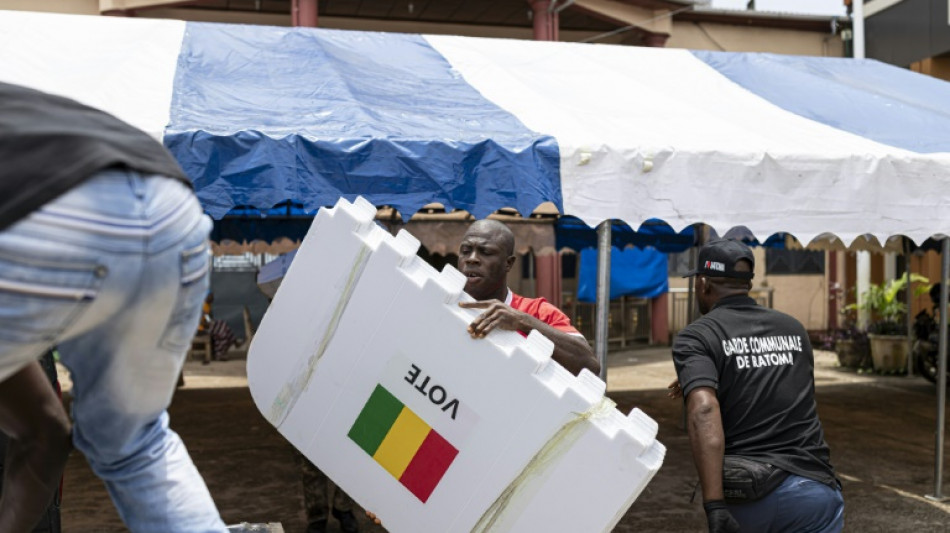
Military-ruled Guinea votes on new constitution

Guineans voted Sunday on a draft constitution that would pave the way for elections but also permit the junta leader who seized power four years ago to run for president.
Boycotted by the opposition, the long-awaited vote opens the way for stalled elections in the West African nation.
The country has been ruled by General Mamady Doumbouya since he overthrew elected civilian president Alpha Conde in 2021.
"This is what everyone is waiting for," one voter, 23-year-old student Ahmad Diallo, told AFP at a school in the capital's Kaloum district.
"To have peace, and we want the transition to end."
AFP journalists noted a sizeable turnout in the affluent city centre of the capital Conakry as well as in several working-class neighbourhoods. Sources contacted by AFP indicated turnout varied across the country and voting passed off peacefully.
Despite a heavy security presence at the voting station and an intense "yes" campaign in recent weeks, Fode Fofana, 44, did not hide his mixed feelings about the referendum.
"We want to an end to the transition, it's not good for Guinea," he told AFP. "We want a transparent presidential election for a civilian president... on the international stage the military is not good for Guinea."
A 72-year-old union representative at a polling station in the poor neighbourhood of Hamdallaye, who asked not to be named, told AFP she had voted in favour of the constitution, hoping for restored constitutional order but fearing that Doumbouya would run for president.
"I came because I have always voted, it is a duty, and we must put an end to the military transition," she said.
But she said the referendum campaign "was not a campaign about a constitution, the propaganda was too strong... Did you see the armoured vehicles, the weapons, the pick-ups: is that for a constitution? No, it's to intimidate people."
- Security measures -
Authorities deployed 45,000 members of the security forces across the country Sunday to police the vote, along with 1,000 light and armoured vehicles and combat helicopters, the National Gendarmerie said.
Some 6.7 million Guineans were able to cast a ballot, out of a population of approximately 14.5 million people.
After polls close at 6:00 pm, results are not expected until Tuesday evening at the earliest, according to the country's election body.
Guinea's military initially pledged to return power to civilians before the end of 2024.
Although its authorities are now promising presidential and legislative elections before the end of the year, the junta has not yet set a date.
Campaigning has been strong in the referendum's "yes" camp: rallies, marching bands and posters depicting 40-year-old Doumbouya have been prevalent throughout the country.
The "no" campaign, however, was virtually non-existent, mainly taking place on social media and often led by the junta's critics abroad who fled the country's crackdown on dissent.
- Opposition brands vote 'charade' -
Since 2022, the junta has banned demonstrations and has arrested, prosecuted or pushed into exile several opposition leaders, some of whom were victims of forced disappearances.
On August 23 the junta suspended two of the country's main opposition parties for three months.
Guinea's opposition called on voters to stay home, denouncing the vote as a "charade" for the junta to keep its hold on power.
If adopted, the new constitution would replace a "transition charter" established by the military government, which had prevented the junta's leaders, government members and heads of institutions from standing in elections.
That rule does not feature in the new draft constitution, paving the way for a presidential run by Doumbouya.
Former president Conde, 87, is living in exile in Istanbul, while opposition leader and ex-prime minister Cellou Dalein Diallo, 73, lives in Dakar and Abidjan.
A.Rastelli--INP

 London
London

 Manchester
Manchester
 Glasgow
Glasgow
 Dublin
Dublin
 Belfast
Belfast
 Washington
Washington
 Denver
Denver
 Atlanta
Atlanta
 Dallas
Dallas
 Houston Texas
Houston Texas
 New Orleans
New Orleans
 El Paso
El Paso
 Phoenix
Phoenix
 Los Angeles
Los Angeles



